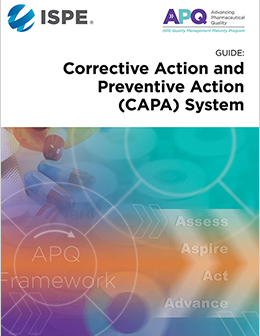ISPE’s volunteer committees are comprised of the following groups.
Regulatory Steering Council (RSC)
The RSC establishes ISPE’s global regulatory priorities in support of ISPE’s Strategic Plan. The RSC provides a forum for facilitating discussion and alignment on regulatory topics and acts as an advisory council to ISPE leadership on responding to emerging regulatory opportunities. In recent months, the RSC has contributed to ISPE’s input on the European Medicines Agencies’ Network Strategy to 2021, an ISPE report on Increasing Domestic Resiliency in Supply of Essential Active Pharmaceutical Ingredients, and feedback to the Pharmaceutical Inspection Co-operation Scheme (PIC/S) on their 2022–2026 Strategic Plan.
Regulatory Quality Harmonization Committee (RQHC)
The RQHC supports ISPE in sustaining its understanding of the global regulatory environments. The committee is structured in four regional focus groups and a global management team. The regional focus groups—Asia-Pacific, Europe-Middle East-Africa (EMEA), Latin America, and North America—provide ISPE with intelligence on regulatory topics and issues of concern in their respective regions and recommend approaches for ISPE’s involvement or response (for example, establishing a working group to develop a paper, conference session, etc.). Current areas of focus for the regional groups include:
- European Commission EudraLex GMP Guide: Annex 11 and Chapter 4
- International Council for Harmonisation of Technical Requirements for Pharmaceuticals for Human Use (ICH) Q9 revision
- PIC/S Annex 2: GMP for ATMP (presentation to be delivered at the ISPE Biotechnology Conference on 22 September)
- Regulatory Challenges of Cell & Gene Therapy (presentation to be delivered at the ISPE Annual Meeting & Expo on 1 November)
- Remote/Distant Assessments
- Risk-based Quality Overall Summary (presentation to be delivered at the ISPE Annual Meeting on 2 November)
- Regulatory updates published on the ISPE website
The RQHC’s management team, which is referred to as RQHC Global, acts a forum where the Regional Focus Group leaders discuss emerging regulatory topics and coordinate any resulting activity. RQHC Global also is tasked with overseeing ISPE’s comments to health authorities on documents released for public consultation, ensuring the feedback is representative of ISPE membership. Commenting opportunities for members are announced on the Regulatory/Quality Networking Community.
In addition to the standing committees described above, ISPE initiative teams address high-profile, cross-industry topics. Current initiative teams include the following.
Advancing Pharmaceutical Quality (APQ)
The APQ initiative team is developing a program by the same name that provides a practical framework for companies to use to assess the maturity and advance the state of quality within their organizations. It is an industry-for-industry program aligned with ICH Q10 principles that aims to identify the practices and behaviors which support the continual improvement of quality within an organization. The APQ Program is being delivered through a series of guides.
- Process Performance and Product Quality Monitoring System (expected to publish in 2021)
- Change Management System (expected to publish in 2022)
Each guide includes detailed diagnostic tools for assessing and potentially improving a company’s maturity in the specific element, and also includes a pre- and post-assessment benchmarking exercise developed by the University of St.Gallen which can be used to measure progress. The APQ team has had several communication exchanges with global regulators during the program’s development. A session focused on the APQ program will be held at the ISPE Annual Meeting on 1 November.
Learn More
Drug Shortages
Any effort to effectively address the complex and multifaceted issues contributing to drug shortages (DS) requires close technical collaboration and clear communication between the pharmaceutical industry and global health authorities. ISPE’s Drug Shortages initiative began nearly 10 years ago with comprehensive research into the manufacturing and quality related causes of DS, and the subsequent publication of guides and tools to help industry build capability in the areas found critical to creating resilient supply chains.
The ISPE Drug Shortages Initiative Team is now entering a new phase of work focused on business continuity planning for the prevention of DS. The COVID-19 pandemic amplified the need for robust and resilient supply chains, which in turn is prompting the introduction of new and evolving regulations related to DS prevention planning. The team recently conducted a survey to obtain an understanding of the state of business continuity plan for drug shortage prevention. They are analyzing the findings and will use them to prioritize and develop activities to further support the industry with business continuity planning and comply with the new and evolving health authority expectations. The team is hosting a regulator discussion panel webinar on 28 September, which will lead into a discussion of preparing proactively for potential drug shortages at a session at the ISPE Annual Meeting on 1 November.
Learn More
Product Quality Lifecycle Implementation (PQLI®)
The Product Quality Lifecycle Implementation (PQLI) initiative was created to provide guidance on practical implementation of the concepts described in ICH guidelines, focusing on Q8, Q9, Q10, Q11, and Q12 to help ensure product quality throughout a product life cycle, leading to continuous product improvement. PQLI concepts have been foundational to advancing science- and risk-based approaches across the product life cycle to achieve excellence in drug development and pharmaceutical production.
Learn More
For more information
News of ISPE’s regulatory and quality activities is reported in the Regulatory Digest quarterly e-newsletter, and on the ISPE website. For more information or for inquiries on joining any of the groups, contact Carol Winfield.


.jpg)



